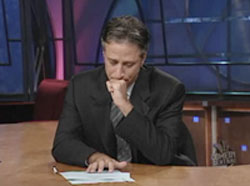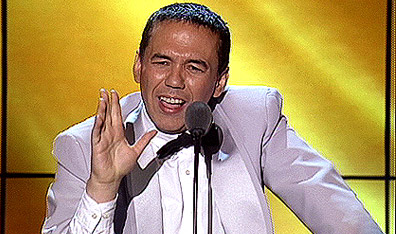Comedy After 9/11
by egavilanes • September 28, 2011 • Features • 0 Comments
By ERIK GAVILANES
In the days and weeks after the tragedies of September 11th, the nation felt a collective pall fall over its psyche. Confusion, helplessness, and fear ran through everyone’s heads and hearts at the time, and our thoughts and prayers were with the families of those fallen and the brave men and women that stepped in to help out at ground zero. This put the world of comedy way, way in the back of the national conscious.
Not only because of how somber Americans felt and the delicacy of the matter, but because after such a monumental event occurred, making jokes just seemed frivolous. There were very real matters at hand, and who needs a jester when the world is on fire?
Getting back to everyday lives seemed hard enough. If you lived in New York City or within the view of its’ skyline, the ash swirling in the streets and the columns of smoke that lingered for far too long were tangible roadblocks on our path to normalcy. ‘Normal’ for a comedian means trying to bring joy to people, and what could have been a harder job than that in September of 2001?
Most networks ran continuous news coverage of the days events, commercial free, for several days on end. If the networks were sacrificing ad dollars, which is the majority of their revenue, then clearly the programs, particularly comedy ones, would be sacrificed as well. All of the late night comedy programs took several days off with most of them returning the week after the tragedies. In this down time, the programs, and their hosts, would search for ways to continue doing what it is they did, and what seemed like an impossibility at the time; make people laugh.
In the now infamous bit of footage from the first Daily Show after the attacks, on September 20th, a visibly emotional Jon Stewart, he a New Jersey native and a longtime Manhattanite, essentially apologized for having to do his job, for trying to make people laugh in the most difficult of conditions, even if it’s what the audience, and he, needed most.
“It’s something that we do for ourselves,” Stewart said, “so that we can drain whatever abscess is in our hearts and move on to the business of making you laugh, which we haven’t been able to do very effectively lately. “
Conan O’Brien echoed a similar sentiment when his show, also based in New York City, came back a week after the attacks. “All I can say is tonight,” O’Brien started, “we’re going to start and we’re going to try and make this little show, which has always been silly and unprofessional and largely inconsequential in the larger world—we’re going to try and do one of these tonight and then we’ll try tomorrow and then so on and so on.”
It was a trying time for all, and for comedians, the outlook seemed bleak.
Ted Alexandro, a New York City based stand-up comedian remembers the days after 9/11. “I really had no desire to get back on stage for the first week or two. I remember the initial feeling was almost like comedy had died; like ‘How can we possibly be funny after this?’ But after a week or two, people were tired of watching the news and needed a distraction. I remember finally going back to the clubs and the crowds were ravenous for comedy or perhaps an experience of community.”
“Everybody was in shock, real shock.” Marc Maron, another stand-up comedian who was living in New York at the time, said, “People, when they laughed, it was the weirdest laugh, because they were like, ‘Help us!’ You do your comedy and they’re laughing like, ‘HAHAHA.’ You did feel like you were helping ease something, and it was impossible to ease it, but we did. We were out there trying to help.”
Had the world changed forever? In many ways, the answer was yes. The events of that day were the catalyst for many social and political changes we’ve seen in the decade since, but people argued that our everyday lives would be dramatically altered in a post 9/11 world, on a psychological and interpersonal level, namely, how humor had changed.
Roger Rosenblatt of Time Magazine wrote on Sept.24, “One good thing could come from this horror: it could spell the end of the age of irony. For some 30 years–roughly as long as the Twin Towers were upright–the good folks in charge of America’s intellectual life have insisted that nothing was to be believed in or taken seriously. Nothing was real.”
In hindsight that Rosenblatt was wrong. Irony is not dead, far from it, but maybe he was caught up in the moment like so many of us were, and in his fear made a bold proclamation about the sensibilities of a nation. No doubt there were people that agreed with Rosenblatt and felt the world was now too grim and matters were too serious for irony and joking to be major contributing factors to our culture. But there were those who opposed this thinking.
“In the immediate aftermath, people were literally like, ‘How will humor work now?’” said Eugene Mirman, a New York comic, “and then a year later people were like, ‘Oh, humor works the same, who knew?’ I knew.”
“That’s why it’s so silly that people would say that after trauma or crisis, or during 9/11 specifically, that comedy has no place. Comedy is literally part of the healing process, ” said Jane Borden, a staff editor at Time Out New York and a comedian.”It’s how you process things and you eventually become okay with something and you laugh at it.”
One comedian, who set out, perhaps prematurely, on the road to healing was Gilbert Gottfried. During his monologue at the Comedy Central Roast of Hugh Hefner, just three weeks after the attacks, Gottfried said, “I have to leave early tonight I have to fly to LA. I couldn’t get a direct flight, we have to make a stop at the Empire State building.”
The crowd booed and hissed and a shout of “Too soon!” rang through the room. As Gottfried described it, “There was a loud gasp, there was mumbling back and forth and you could hear the chairs move. And then I went into telling the Aristocrats joke and that somehow turned it all around.”
After having the audience turn on him for the 9/11 reference, he got them back with “The Aristocrats” joke—a famous joke that has been told by many comedians since the days of Vaudeville—which yielded huge laughs. In a documentary about “The Aristocrats” joke, Gottfried is credited with providing the first communal and cathartic laugh after the tragedy of 9/11.
Stewart said, in that first Daily Show back, that, “Our show has changed; I don’t doubt that, what it’s become, I don’t know. Subliminal is not a punch line anymore. One day it will become that again, and lord willing it will become that again because it will mean that we have ridden out the storm.”
In the decade since 9/11, we have certainly ridden out the storm. Comedy is not only back, but is currently in a state of boom. The wounds that formed when the towers fell have not been forgotten, but time and distance has scabbed over them. Comedians are able to make references to 9/11, when handled carefully, without fear of losing their audience and jokes have been made on large platforms such as network television that directly references it as well.
It’s difficult to pinpoint the exact impact that 9/11 made on comedy and vice versa. Comedy was used as a distraction, to ask questions about the world around us, and to heal. When the question, “Is comedy dead?” was asked in that time, the answer needed serious consideration. But we were all urged by our leaders to get back to normal living, of which laughter is an important part of.
Stewart closed his monologue on that day with, “The view from my apartment…was the World Trade Center…and now it’s gone. They attacked it, this symbol of American ingenuity, and strength, and labor, and imagination, and commerce and it is gone. But you know what the view is now? The Statue of Liberty. The view from the south of Manhattan is now The Statue of Liberty. You can’t beat that.”
SEE VIDEO OF: Jon Stewart\’s First Show Back After 9/11

